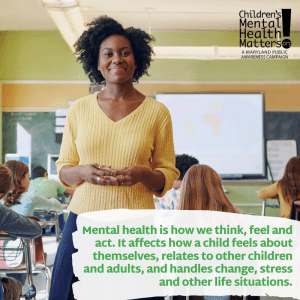As a teacher, school administrator or school counselor, you are in a unique position to notice mental health conditions that children may have and to help families understand these issues.
Children of all ages, even as young infants, can experience mental health conditions. It can be difficult knowing the kinds of behaviors and moods that are usual for the stage of development a child is in and a child has gone beyond the norm and needs help.
 One in five children and adolescents may have a mental health condition at any given time. It is important to remember that a child’s mental health is just as important as their physical health.
One in five children and adolescents may have a mental health condition at any given time. It is important to remember that a child’s mental health is just as important as their physical health.
Almost two-thirds of all young people with mental health conditions are not getting the help they need. Without support, children and youth may experience school failure, substance use and family trouble.
A child’s age, stage of development and ability to communicate can make it difficult to distinguish between a mental health problem and natural development.
Some of these conditions, such as anxiety disorders, eating disorders, mood disorders and schizophrenia, can occur in adults as well as children. Others, such as behavior and development disorders, elimination disorders, and learning and communication disorders, begin in childhood only, although they can continue into adulthood.
If you think a child needs help
If you are worried about the emotions and behaviors of a child you are working with, you can start by talking to their family members. Perhaps they are concerned about the child also.
You can also offer support and guidance to the child and their parents, as many families do not know where to start in seeking help. One way to do this is with resources. Please refer to to our Educator Resource Kit or Family Resource Kit, both available on our downloads page, which include signs and symptoms of many mental health conditions as well as resources and supports to benefit the school system and families. These are all available for download or for ordering at no cost.
Mental Health Association of Maryland
www.mhamd.org
Maryland Coalition of Families
www.mdcoalition.org
Education Behavioral Health Community of Practice (CoP) Free Professional Development Guide
Maryland Learning Links
www.marylandlearninglinks.org
The National Child Traumatic Stress Network
http://www.nctsnet.org/nccts/nav.do?pid=hom_main
Resources for school personnel, please visit:
http://www.nctsnet.org/nccts/nav.do?pid=ctr_aud_schl
Think port: Think Education. Think Maryland.
http://www.thinkport.org
Maryland Behavioral Health Integration in Pediatric Primary Care (BHIPP) – Quick Tips for Providers
https://mdbhipp.org/quick-tips-for-providers.html
-Designed to address common behavioral health concerns that children and adolescents present with in the primary care setting. The tips include how to explain behavioral health concerns to children and families and strategies to improve mental wellness.
Substance Use
- Getting Candid: Framing the Conversation Around Youth Substance Use Prevention message guide from National Council for Mental Wellbeing and toolkit equips youth-serving providers and organizations with the tools and resources necessary to support meaningful prevention messaging. In this toolkit you can access messaging on youth substance use prevention, tip sheets, social media graphics and shareables, videos, webinars, interactive worksheets, and educational courses. Download guide. (Released December 2021)